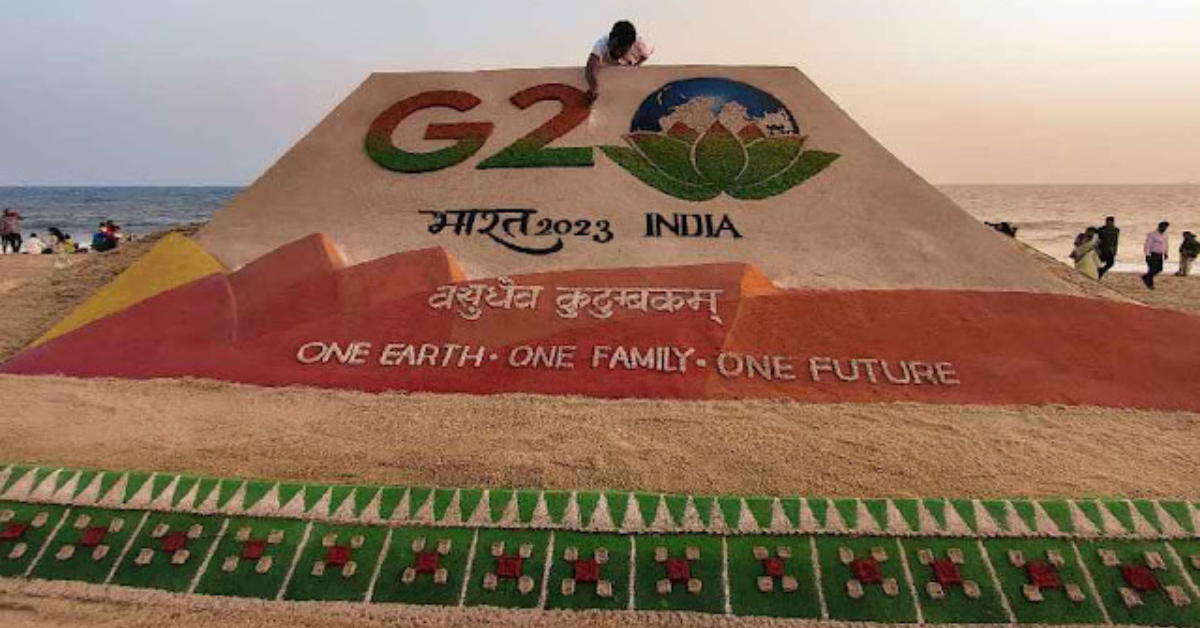Contact: +91 99725 24322 |
Menu
Menu
Quick summary: Explore India's pivotal role in the G20 Presidency and its efforts to foster global unity amid the climate crisis and other challenges. Learn about India's strategies for international carbon markets, green hydrogen adoption, and afforestation measures.

The concept of “ Vasudhaiva Kutumbakam” resonates deeply in this world characterized by diverse cultures, languages and ideologies. Translated as “The world is one family”, it encapsulates the essence of shared humanity which is the need for global unity. During India’s G20 Presidency, this profound philosophy has been transformed into a call for human-centric progress and a commitment to nurture our planet as one Earth and one Family.
In this blog post we delve into the transformative journey of India’s G20 Presidency, exploring its key initiatives and their potential to shape a more inclusive, sustainable and interconnected world.
The three crucial transformations that unfold in the global landscape have their own challenges and opportunities.
Recognizing the well-being of humanity should be at the forefront of our priorities and this shift emphasizes the importance of holistic progress that uplifts every individual.
The disruptions caused by the pandemic and recently the climate crisis has underscored the vulnerabilities in our interconnected world. Strengthening supply chains enhance global stability and security.
Global challenges today are interconnected, and multilateralism is vital for addressing issues such as climate change, health crisis and economic disparities.
As we approach the midway mark of the 2030 Agenda, it becomes evident that progress on SDGs
is lagging. The action plan aims to reinvigorate efforts towards achieving these goals, emphasizing the importance of a sustainable and resilient future for all.
For centuries, living in harmony with nature has been a fundamental ethos of India. India’s commitment to climate actions is not just evident in its words but also in its actions. Ambitious climate goals should be matched with tangible action on climate finance and transfer of technology. A number of initiatives including sustainable management of oceans have substantiated India’s commitment to sustainable practices.
Individuals need to make lifestyle choices that impact the planet’s well-being as well. India’s LiFE, “Lifestyles for Sustainable Environment” initiative encourages sustainable living. The movement inspires people worldwide to make choices that benefit the environment, aligning personal well-being with planetary health.
In the face of climate change, food and nutritional security are of great importance. This year being the International year of Millets has made India introduce millets to the global cuisine. Millets known as “Shree Anna” offer a climate smart solution to ensure food security while promoting sustainable agriculture.
India recognizes that technology should be inclusive, benefitting all sections of the society. Initiatives like Digital Public Infrastructure (DPI) have empowered marginalized communities and bridged digital divides.
Bridging the gender digital divide, reducing labour force participation gaps and enabling a larger role for women in leadership and decision making are crucial goals of India’s G20 Presidency.
This moment offers a crucial platform to demonstrate India’s leadership and expertise, especially in the context of the environmental challenges that loom large. The climate crisis stands as the most pressing global threat today. July marked the hottest month on record, while deadly wildfires, floods, storms have wreaked havoc on communities worldwide.
According to the World Meteorological Organization, over the past 50 years, extreme weather events have claimed two million lives and caused economic losses of $4.3 trillion.
While we understand that tackling climate change requires collective effort, the pressing need for such cooperation arises during a period when global cooperation seems increasingly fragile.
India’s G20 Presidency is not just a diplomatic endeavour, it has become a people driven movement. With over 200 meetings held in 60 Indian cities, hosting nearly 100,000 delegates from 125 countries, it encompasses vast and diverse geographies. This inclusive approach aims to bridge divides, dismantle barriers and nurture collaboration on a global scale.
India’s role in combating climate change is pivotal on the global stage. As the president of the G20 and the world’s most populous country, India has a unique opportunity to foster international cooperation and expedite climate action. Effective collaboration between the public and private sectors will be paramount in advancing these initiatives.
The time has come for India to spearhead the reinforcement of global climate cooperation. With the G20 Heads of State and Government Summit set to take place in New Delhi, India has an unique opportunity to galvanize collective and collaborative efforts ahead of the United Nations Climate Change Conference in the UAE (COP28) this November. India’s chosen theme “One Earth, One Family, One Future” underscores the imperative to unite for a common cause, particularly on issues like climate change that will profoundly impact our shared destiny.
According to UN, “It is now or never to limit global warming”.
India could take several strategic steps, including to champion the establishment of International Carbon Markets. Within the G20, India can encourage formation of smaller group of countries that collaborate on bilateral agreements regarding carbon markets aligning with the Article 6.2 of the Paris Climate Agreement. Also, India can advocate for joint mandates on usage of green hydrogen, expedite corporate decarbonization efforts and harmonize incentives to support large-scale afforestation initiatives.
India’s G20 Presidency exemplifies the nation’s commitment to fostering unity, inclusivity and sustainability on a global scale. It recognizes that challenges transcend borders and collective action determines the fate of our planet.
This is why both India’s commitment to climate action and its current role as a global convener in its capacity as the president of G20 are so vital for moving the climate action forward.
As we progress together as one Earth and one family, India’s G20 Presidency should guide us towards a future where unity prevails over discord, shared destiny eclipses isolation and sustainable development becomes the cornerstone of our global journey.
